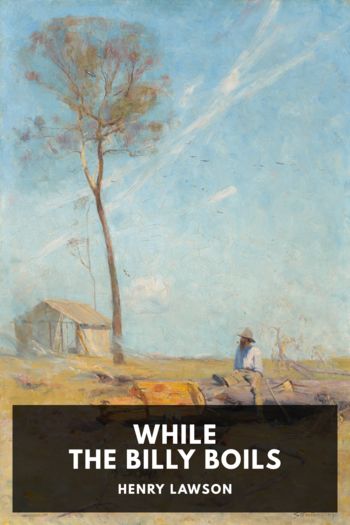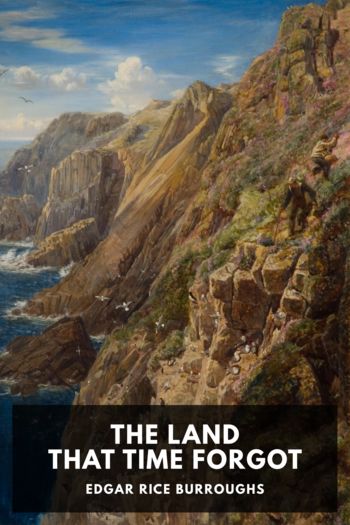While the Billy Boils, Henry Lawson [hardest books to read .txt] 📗

- Author: Henry Lawson
Book online «While the Billy Boils, Henry Lawson [hardest books to read .txt] 📗». Author Henry Lawson
“Have you got that bit of straw yet, Tom?”
Those old mates had each three pasts behind them. The two they told each other when they became mates, and the one they had shared.
And when the visitor had gone by the coach we noticed that the old man would smoke a lot, and think as much, and take great interest in the fire, and be a trifle irritable perhaps.
Those old mates of our father’s are getting few and far between, and only happen along once in a way to keep the old man’s memory fresh, as it were. We met one today, and had a yarn with him, and afterwards we got thinking, and somehow began to wonder whether those ancient friends of ours were, or were not, better and kinder to their mates than we of the rising generation are to our fathers; and the doubt is painfully on the wrong side.
Settling on the LandThe worst bore in Australia just now is the man who raves about getting the people on the land, and buttonholes you in the street with a little scheme of his own. He generally does not know what he is talking about.
There is in Sydney a man named Tom Hopkins who settled on the land once, and sometimes you can get him to talk about it. He did very well at his trade in the city, years ago, until he began to think that he could do better upcountry. Then he arranged with his sweetheart to be true to him and wait whilst he went west and made a home. She drops out of the story at this point.
He selected on a run at Dry Hole Creek, and for months awaited the arrival of the government surveyors to fix his boundaries; but they didn’t come, and, as he had no reason to believe they would turn up within the next ten years, he grubbed and fenced at a venture, and started farming operations.
Does the reader know what grubbing means? Tom does. He found the biggest, ugliest, and most useless trees on his particular piece of ground; also the greatest number of adamantine stumps. He started without experience, or with very little, but with plenty of advice from men who knew less about farming than he did. He found a soft place between two roots on one side of the first tree, made a narrow, irregular hole, and burrowed down till he reached a level where the taproot was somewhat less than four feet in diameter, and not quite as hard as flint: then he found that he hadn’t room to swing the axe, so he heaved out another ton or two of earth—and rested. Next day he sank a shaft on the other side of the gum; and after tea, over a pipe, it struck him that it would be a good idea to burn the tree out, and so use up the logs and lighter rubbish lying round. So he widened the excavation, rolled in some logs, and set fire to them—with no better result than to scorch the roots.
Tom persevered. He put the trace harness on his horse, drew in all the logs within half a mile, and piled them on the windward side of that gum; and during the night the fire found a soft place, and the tree burnt off about six feet above the surface, falling on a squatter’s boundary fence, and leaving the ugliest kind of stump to occupy the selector’s attention; which it did, for a week. He waited till the hole cooled, and then he went to work with pick, shovel, and axe: and even now he gets interested in drawings of machinery, such as are published in the agricultural weeklies, for getting out stumps without graft. He thought he would be able to get some posts and rails out of that tree, but found reason to think that a cast-iron column would split sooner—and straighter. He traced some of the surface roots to the other side of the selection, and broke most of his trace-chains trying to get them out by horsepower—for they had other roots going down from underneath. He cleared a patch in the course of time and for several seasons he broke more ploughshares than he could pay for.
Meanwhile the squatter was not idle. Tom’s tent was robbed several times, and his hut burnt down twice. Then he was charged with killing some sheep and a steer on the run, and converting them to his own use, but got off mainly because there was a difference of opinion between the squatter and the other local J.P. concerning politics and religion.
Tom ploughed and sowed wheat, but nothing came up to speak of—the ground was too poor; so he carted stable manure six miles from the nearest town, manured the land, sowed another crop, and prayed for rain. It came. It raised a flood which washed the crop clean off the selection, together with several acres of manure, and a considerable portion of the original surface soil; and the water brought down enough sand to make a beach, and spread it over the field to a depth of six inches. The flood also took half a mile of fencing from along the creek-bank, and landed it in a bend, three miles down, on a dummy selection, where it was confiscated.
Tom didn’t give up—he was energetic. He cleared another piece of ground on the siding, and sowed more wheat; it had the rust in it, or the smut—and averaged three shillings per bushel. Then he sowed lucerne and oats, and bought a few cows: he had an idea of starting a dairy. First, the cows’ eyes got bad, and he sought the advice of a German cockie, and acted upon it; he blew powdered alum through paper tubes into the bad eyes, and got some of it snorted and butted back into his own. He





Comments (0)